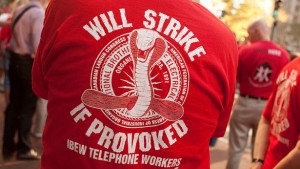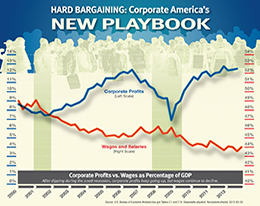By Gretschman for Occupy World Writes
When the Great Recession struck with full force in 2008, many companies demanded deep concessions.
Workers across North America, including thousands of IBEW members, made numerous sacrifices to help their employers make it through those tough times.
Since then the economy has made a major turnaround — but most of its benefits are going to the top 1 percent of earners.
Profits have hit an all-time high. At the same time, wages as a percent of the economy have hit an all-time low.
Even at unionized companies, IBEW negotiators are confronting cash-rich employers who have replaced mutually beneficial collective bargaining with a winner-take-all, adversarial relationship — an approach some union activists are calling “hard bargaining.”
“There are companies out there struggling, but even companies that are doing well are bullying everyone like it is still 2008,” said IBEW Manufacturing Department Director Randy Middleton. “They don’t need the concessions, their survival doesn’t depend on givebacks, but they know workers have been afraid and they’ve sharpened their knives.”
Across the nation, profitable companies like Rockwell Collins, Schneider Electric and GE are demanding the closure of pensions, pay freezes and higher health care costs.
Even a company like Southern California Edison, which has maintained a constructive relationship with its workers for decades, recently hired a union-busting lawyer to lead negotiations.
The trend is clear: corporations can afford to pay higher wages, they just aren’t, and every day companies are paying their workers less.
“Every business knows, in the long run, we rise together,” said IBEW International President Edwin D. Hill. “But what we are finding now are companies in one industry after the next, squeezing their workers without ever giving a thought to how it might end.”
In California, ‘Union-Busting 101’
For decades, Diamond Bar, Calif., Local 47 and Southern California Edison enjoyed a fruitful relationship, negotiating strong contracts beneficial to both employees and the company.
That is, until this year.
Negotiations on a new contract have been poisoned by the company’s refusal to bargain in good faith, said Local 47 Business Manager Pat Lavin.
Local 47 represents more than 4,000 workers at Southern California Edison.
“When we first sat down for pre-bargaining last year, we were led to believe it wouldn’t be contentious,” said Lavin, who also represents the Seventh District on the International Executive Council. “Instead we got hit with 150 takeaway proposals.”
Among the company’s demands are cuts to overtime, weakening of seniority rules and cutbacks to paid sick leave and vacation.
Management hired anti-labor lawyer Adam Abrahms to assist with bargaining. He boasts on his website that he has assisted in more than 100 anti-union campaigns, including beating back organizing drives at San Francisco International Airport and decertifying a unit of the California Nurses Association.
Most galling, said Lavin, is the fact that the top officers cashed out more than $90 million in Edison stock options last year. “They’re making bank, while telling us to make givebacks.”
Members have been taken by surprise by the company’s insistent demands, especially considering the close working relationship Local 47 enjoyed with the company.
The IBEW often lobbied on behalf of Southern California Edison on legislative issues in Sacramento. Most recently, Local 47 worked with management to devise an agreement between the local building trades and the company around staffing the shutdown of the San Onofre Nuclear Generating Station, SCE’s nuclear plant.
“The help we gave SCE kept the company going,” said Lavin. “In my 15 years as business manager and 48 years as an IBEW member, I’ve never seen Edison’s management treat its workers with such disrespect.”
SCE’s anti-worker approach isn’t limited to union members. In February, the company announced it would lay off more than 400 information technology workers and replaced them with workers from India. Many of the new employees are in the United States as guest workers.
The H-1B visa program “was supposed to be for projects and jobs the American workers could not fill,” one SCE IT worker told Computer World. “But we’re doing our job. It’s not like they are bringing in these guys for new positions that nobody can fill.”
Local 47 members have been encouraged to contact management to register their disapproval with the company’s “hard-bargaining” approach.
The contract, which expired Dec. 31, has been extended.
“This has the tone of nothing more than simple union-busting 101,” said a Local 47 bargaining update newsletter. “We will stick to the path we are on to obtain a reasonable and positive outcome to these proceedings.”

Photo: We Party Patriots
Holding the Line in New England
A difficult contract negotiation can test the mettle of even the most dedicated trade unionist.
For nearly 2,000 FairPoint Communications workers in New England who have been on strike since Oct. 17, the long winter and dwindling personal finances have been a profound test of solidarity and camaraderie.
“In many ways, it’s drawn people closer together, IBEW and CWA, who share a common interest,” said Bob Erickson, IBEW international representative from the Second District. “We’ve seen a lot of strength. This group of union members has done an outstanding job.
“At the same time, people want to get back to work,” he said. “This is tough on everybody. It’s difficult for people trying to make ends meet, being on a picket line in five feet of snow in 8-degree weather.
In February, workers in Maine, New Hampshire and Vermont entered their fifth month on strike. FairPoint has sought millions in concessions, canceled health benefits for strikers, slashed pensions and wants to outsource highly-skilled New England jobs to low-paid, out-of-state contractors.
The unions and FairPoint agreed to mediation talks in Washington, D.C., with the Federal Mediation and Conciliation Service beginning Jan. 4. Under the terms of mediation, both the unions and FairPoint are prohibited from commenting on negotiations.
In the meantime, workers and activists have been doing what they can to keep morale high while confronting the hard financial realities of being off the job.
“We’re not looking to get rich, we’re just looking to sustain our families,” said Mike Gauthier, a FairPoint service technician and member of Montpelier, Vt., Local 2326. “We offered the company a compromise that would save them millions in health care costs, but they refused. We’ve got to stand up for our families and for good jobs.”
One thing helping workers like Gauthier make it through is a strike fund established by the union leadership. So far, fellow members and supporters have contributed about $250,000.
“A lot of workers who were having a really hard time were able to get Christmas gifts for their kids, money to buy heating fuel, grocery store gift cards and some help with their mortgages,” Erickson said. “Without the strike fund, a lot of people would be in worse financial shape. I’m talking lost homes, repossessed vehicles — it could be a lot worse.”
North Carolina-based FairPoint purchased Verizon’s landline network serving Maine, New Hampshire and Vermont in 2008. Lacking the resources and experience to maintain a vast telecommunications infrastructure, FairPoint soon went bankrupt — a possibility that the IBEW had warned about during the sale. Hard work from employees like Marc Jutras, who has 15 years with the company, helped put FairPoint back on solid ground. But the company has insisted on cutting back wages and job security from the workers who helped them right their fiscal ship.
“We’ve made concessions — we’ve worked overtime to get this company to be what it is today,” Jutras said in one of four television ads that ran in New England markets calling on FairPoint to return to the bargaining table. “We’ve brought them through bankruptcy. All we’re looking to do is get back to work.” The ads can be seen at www.bit.ly/IBEWFairPointAd.
While parties’ lips remain sealed on the specifics of the federal mediation, Erickson said issues are moving forward.
“The fact that we’re talking under the auspices of federal mediation is a huge boost to morale,” he said. “We’ve been able to focus on the core issues and move the process along. There’s no timetable for making decisions, but talks will continue. We’ll keep making progress and hope for a resolution soon, so these hardworking and skilled members can get back to work.”
The unions’ bargaining committee — consisting of representatives from Manchester, N.H., Local 2320; Montpelier, Vt., Local 2326; Augusta, Maine, Local 2327; and CWA Local 1400 in Portsmouth, N.H. — highlighted the significance of members’ efforts in a Jan.31 letter: “Make no mistake. Our allies all over the country are watching this historic struggle unfold. They have been moved by your unity, your commitment and your strength. They know that you are standing up not just for your own jobs, but for dignity, respect and fairness for all working people.”
To donate to the members’ strike fund, visit www.gofundme.com/IBEW-CWA-Strike-Relief.

Boston, 2011. Photo: Paul Weiskel (Flickr),
Putting the Squeeze on Manufacturing Workers
Although the relative size of manufacturing in the U.S. economy has stayed nearly the same, since 2000 nearly 5.7 million jobs have been lost, according to a report from the Brookings Institution, a nonpartisan think tank.
Manufacturing is still highly profitable, for manufacturers.
But even as profits have grown, wages have sagged. Fewer people do more and more specialized jobs, but still make less.
“In 2008, workers everywhere were terrified about losing their jobs and told companies they just wanted to keep their jobs,” Middleton said. “So the companies took them at their word and declared all-out war.”
First companies went after wages, Middleton said. Time after time, companies in the black offered one-time payments to current employees to allow lower wages for new hires.
“We’ve seen the data and two-tier wage structures cause dissension in the shop and hurt corporate performance, but they keep coming to the table and demanding it,” he said.
Recently, however, Middleton said companies are focusing less on squeezing more from wages and instead, attempting to eliminate pensions.
In 2011, General Electric pulled in more than $14 billion in profits. That same year it closed its pension plan to new hourly hires and moved them all into 401(k) plans.
In 2013, Schneider Electric, the French multi-national electronic components manufacturer, earned more than $1.8 billion in profits. As contract negotiations began for nearly 600 IBEW-represented members, Schneider proposed ending retirement benefits entirely for new hourly hires.
“They seemed shocked that we said no,” Middleton said. “The only reason they offered was that we had agreed to it somewhere else. They didn’t even bother with a business justification.”
Despite productivity growth over 3 percent in 2013, contract negotiations at Schneider were relentlessly negative and the dispute was only resolved after a two-week strike by more than 200 workers at Schneider’s Ohio plant.
“I don’t think these companies are really thinking this through,” Middleton said. “They may not be intending this, but the trend now is that to get a decent contract, you have to strike.”
Middleton says next in the firing line for most companies will be health care benefits. Even with costs falling for the first time in decades, profitable companies are still trying to shift workers into high-deductible plans that cost more and offer less.
Defense manufacturer Rockwell Collins made nearly $1 billion in profits last year, but in contract negotiations with their 2,000 Iowa IBEW members, they attempted to raise deductibles and reduce benefits. Six weeks of negotiations sweetened the final offer but it was another case of high profits and high productivity growth benefiting stockholders and management and leaving the workers not much better off.
“At the end of the day, we only succeed when the company succeeds, but too many companies have convinced themselves it isn’t true the other way around,” Middleton said. “It’s greed and it won’t end well.”
ADT ‘Playing the Game’
ADT is a company following a well-worn playbook to prevent its workers from collectively bargaining.
Nearly 20 technicians working for the multinational home and office security company voted in 2013 for representation from Winston-Salem Local 342.
Since then, stalling tactics by the company prompted a 9-9 vote for decertification last October — mostly from newer, younger hires who hadn’t been part of the original campaign.
Lucas Aubrey, a labor attorney representing the IBEW who is familiar with the organizing efforts at ADT, said, “Sophisticated employers know how to play the game. Companies will drag out contract talks until some workers start to dissent, then some will call for a decertification.”
But IBEW representatives filed unfair labor practice complaints after the company put pressure on workers to vote “no” during a 24-hour period when ADT was restricted from certain forms of contact with the employees.
“We found out a supervisor had been contacting employees and encouraging them to oppose the organizing effort,” said Tenth District Lead Organizer David Haynes.
In this case, it backfired. The NLRB, agreeing with the union, threw out the decertification vote results and rescheduled a new election. Workers then voted on Jan. 14 to remain with the IBEW by a more than 2-1 margin. Haynes said the group is back on track to push for bargaining, despite the company’s opposition.
At American Water, ‘A Long Struggle’
Sometimes new company leadership and continued efforts by workers can open the door for change. That’s what happened last fall at public utility American Water, whose management put forth a settlement agreeing to pay nearly $10 million in lost benefits to members of 19 unions representing workers at the company. The settlement was ratified by union members in October by a margin of 2 to 1.
During contract negotiations four years ago, the company unilaterally implemented an agreement on its workforce that reduced or eliminated benefits. Nearly 3,500 employees got hit harder with health care expenses.
The unions filed an unfair labor charge that was upheld by the NLRB. But the company appealed the decision for years, leaving the workers’ fates in legal limbo.
American Water changed its leadership last spring, and “the Brotherhood had a decent relationship with a member of the management team,” said IBEW Utility Department Director Jim Hunter. That relationship, he said, was critical to unions reaching the settlement agreement.
“We are hopeful that this marks not just the end of a long struggle, but the beginning of a new relationship between American Water and unions representing thousands of employees,” said International President Edwin D. Hill. “These workers are deeply invested in their jobs — it stands to reason that the company should be deeply invested in its hard-working people, too.”
This article appeared in the March 2015 issue of “The Electrical Worker,” a publication of the International Brotherhood of Electrical Workers. Republished with permission.


